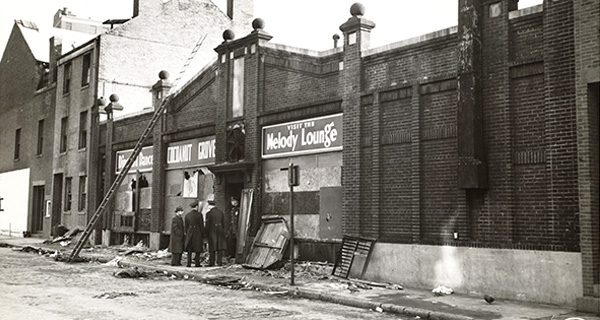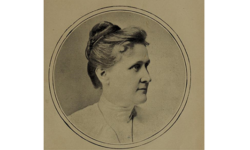By Bill Lombardi
Hometown Weekly Correspondent
Saturday, November 28, 1942, was a cold night when 28 year-old Alice Ruth Brady and friends arrived at Cocoanut Grove in Boston. Brady lived at 274 East St. in Walpole and was a graduate of Walpole schools. She worked as a press feeder for a Walpole newspaper.
Her destination was a nightclub located on Piedmont Street in the Back Bay area. The club opened in 1927 during Prohibition and was used as a speakeasy by gangster and bootlegger Charlie “King” Solomon, who later was murdered at a restaurant in the South End. The entertainment he brought included floor shows, chorus girls, and many famous stars.
Under its new owner, Barney Welansky, the business continued to flourish as one of the most popular nightclubs around. It was known for its homey atmosphere, world-famous entertainers, and radio personalities who often visited. There were three main rooms. The largest was the dine and dance floor. Nearby was the new docktail lounge. In the basement was the Melody Lounge and the main entrance to the Grove. The revolving doors were located near the lounge.
These were the World War II years and the streets of Boston were filled with servicemen. Many of them were at the club this night. Bandleader Micky Alpert, also the official welcoming host, would announce the names of well-known celebrities as they entered the club. A tall man wearing high leather boots caught the eyes of the audience. He was Hollywood cowboy movie star Charles “Buck” Jones, who was in town for a promotional tour.
The Boston College football team was having a great winning season and, anticipating a win in its last game, had reserved a section at the club for a victory celebration. In a stunning upset, Holy Cross defeated the Eagles, 55-12. Boston College cancelled its reservations.
Doing so probably saved the players’ lives.
It was a little after 10 p.m. when 16 year-old busboy Stanley Tomaszewski, who lived in Dorchester, went into the Melody Lounge to replace a light bulb. Unable to find the socket, Stanley lit a match. Moments later, flames were seen engulfing a nearby palm tree. It leaped from tinsel to tinsel that hung along the ceiling. Out of control, the fire gathered force and spread upstairs.
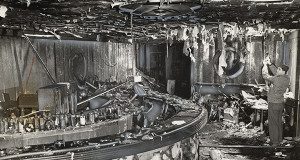 Patrons, entertainers and employees fought desperately in the dark to find a way out. Many made a mad rush for the revolving doors. They knocked down chairs and tables in their haste, only to sprawl over them. Boston firefighter George Graney of South Boston was one of the first firemen to arrive. He saw people lying all over the sidewalk crying and moaning. Fire engines arrived from all directions to help. The flames broke through the roof and the reflection against the sky quickly brought huge crowds.
Patrons, entertainers and employees fought desperately in the dark to find a way out. Many made a mad rush for the revolving doors. They knocked down chairs and tables in their haste, only to sprawl over them. Boston firefighter George Graney of South Boston was one of the first firemen to arrive. He saw people lying all over the sidewalk crying and moaning. Fire engines arrived from all directions to help. The flames broke through the roof and the reflection against the sky quickly brought huge crowds.
A frightful struggle continued within the club as people collapsed from the poison fumes and jammed the revolving doors. About 50 people rushed for the kitchen only to find themselves trapped and unable to find the exit in the darkness. Some people found exit doors but couldn’t get out because they were bolted. Many people were saved by employees who knew a way out.
One of the most dramatic rescues was made by Marshall Cole, from South Boston. He organized and led about 35 people through a flaming corridor to safety by smashing a window and leading them to an adjoining roof where a small ladder was found. It took the fire department about 45 minutes to extinguish the flames. George Graney remembered when they pushed in a portable light, they saw people sitting in chairs at tables. He touched the back of their necks before placing them on stretchers.
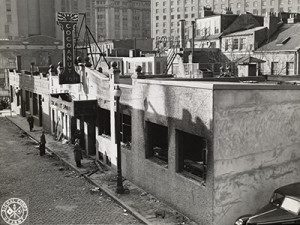 The firemen began the difficult task of removing the corpses from the building. Inside, in front of the revolving doors was a large pile of bodies. Many died a painless death even though they were badly burnt; the poison fumes overcame them. When the firefighters opened the large walk-in refrigerator, out came ten weary survivors.
The firemen began the difficult task of removing the corpses from the building. Inside, in front of the revolving doors was a large pile of bodies. Many died a painless death even though they were badly burnt; the poison fumes overcame them. When the firefighters opened the large walk-in refrigerator, out came ten weary survivors.
The victims were taken to every hospital available. Alice Ruth Brady’s body was taken to the mortuary at the Boston City Hospital. To stop the hospitals from being overcrowded, doctors were sent down to the Grove; after they pronounced someone dead, the corpses were taken directly to the morgue. Movie star Buck Jones was taken to Mass General Hospital, where he later died. Friends and family members of the victims were very bitter about the safety violations at the club.
Twenty year-old Mary McCormack and her girlfriend, Ruth Knox, both of South Boston, lost their lives in the fire. Mary’s father, Edward “Knocko” McCormack, a well-known figure, took a swing at Mayor Tobin, when he came to the wake to pay his respects. Ruth Knox was engaged to Mary’s brother, Edward, who later became the Attorney General of Massachusetts. 491 people died in the fire.
Barney Welansky, who owned the building, was charged with manslaughter and sent to prison. Stanley Tomaszewski, the young busboy, suffered much verbal abuse. The shadows of the Grove fire followed him throughout his life.
Alice Ruth Brady was buried in St. Francis Cemetery in Walpole. The law now states that wherever revolving doors are in public places, there must be regular standard doors nearby for people to exit in an emergency.
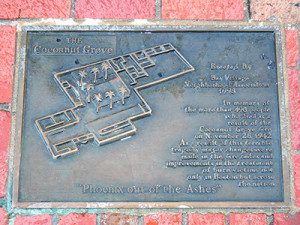 Before the fire, very little was known about the treatment of severe burns. But because of the victims, particularly Clifford Johnson, a 20 year-old farmer from Missouri, valuable knowledge was gained. Johnson was a Coast Guardsman stationed in Boston and was engulfed in flames when he landed on the sidewalk. With burns almost down to the bone, unconscious and in shock, he wasn’t given much hope by the doctors at Boston City Hospital to survive. He was determined live and after spending many months in the hospital, he miraculously pulled through. While a patient at the hospital, he met and married student nurse Marion Donovan of West Roxbury. Together, they returned to Missouri to settle down and raise a family.
Before the fire, very little was known about the treatment of severe burns. But because of the victims, particularly Clifford Johnson, a 20 year-old farmer from Missouri, valuable knowledge was gained. Johnson was a Coast Guardsman stationed in Boston and was engulfed in flames when he landed on the sidewalk. With burns almost down to the bone, unconscious and in shock, he wasn’t given much hope by the doctors at Boston City Hospital to survive. He was determined live and after spending many months in the hospital, he miraculously pulled through. While a patient at the hospital, he met and married student nurse Marion Donovan of West Roxbury. Together, they returned to Missouri to settle down and raise a family.
But on December 20, 1956, while driving home from work, Clifford’s pickup truck hit an abutment, turned over and pinned him under it. The gas tank exploded. Before anyone could pull him out, he burnt to death in the blazing fire.
Bill Lombardi is a U.S. Marine Corps veteran. He is the grandfather of Emily, Ashley and Zachary Sullivan, and Cayce and Jimmy Lombardi - all Walpole residents.





